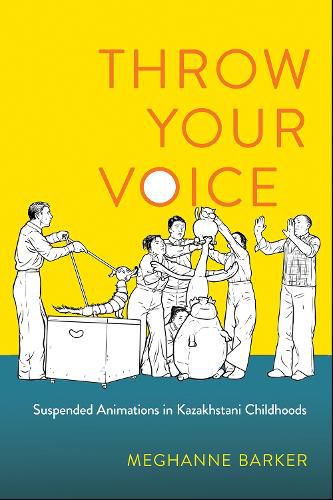Readings Newsletter
Become a Readings Member to make your shopping experience even easier.
Sign in or sign up for free!
You’re not far away from qualifying for FREE standard shipping within Australia
You’ve qualified for FREE standard shipping within Australia
The cart is loading…






Throw Your Voice is a story of loss and recovery. It relates how children placed in a temporary care institution make sense of their situations. Moving between a Kazakhstan government children's home, Hope House, and the Almaty State Puppet Theater, Meghanne Barker shows how children, and puppets, as proxies, bring to life ideologies of childhood and visions of a rosy future. Sites and stories run in parallel. Framed by the narrative of Anton Chekhov's "Kashtanka," about a lost dog taken in by a kind stranger, the author follows the story's staging at the puppet theater. At Hope House, children find themselves on a path similar to Kashtanka, dislodged from their first homes to reside in a second.
The heart of this story is about living in displacement and about the fragile intimacies achieved amidst conditions of missing. Whether due to war, migration, or pandemic, people get separated from those closest to them. Throw Your Voice examines how strangers become familiar, and how objects mediate precarious ties. She shows how people use fantasy to mitigate loss.
$9.00 standard shipping within Australia
FREE standard shipping within Australia for orders over $100.00
Express & International shipping calculated at checkout
Throw Your Voice is a story of loss and recovery. It relates how children placed in a temporary care institution make sense of their situations. Moving between a Kazakhstan government children's home, Hope House, and the Almaty State Puppet Theater, Meghanne Barker shows how children, and puppets, as proxies, bring to life ideologies of childhood and visions of a rosy future. Sites and stories run in parallel. Framed by the narrative of Anton Chekhov's "Kashtanka," about a lost dog taken in by a kind stranger, the author follows the story's staging at the puppet theater. At Hope House, children find themselves on a path similar to Kashtanka, dislodged from their first homes to reside in a second.
The heart of this story is about living in displacement and about the fragile intimacies achieved amidst conditions of missing. Whether due to war, migration, or pandemic, people get separated from those closest to them. Throw Your Voice examines how strangers become familiar, and how objects mediate precarious ties. She shows how people use fantasy to mitigate loss.